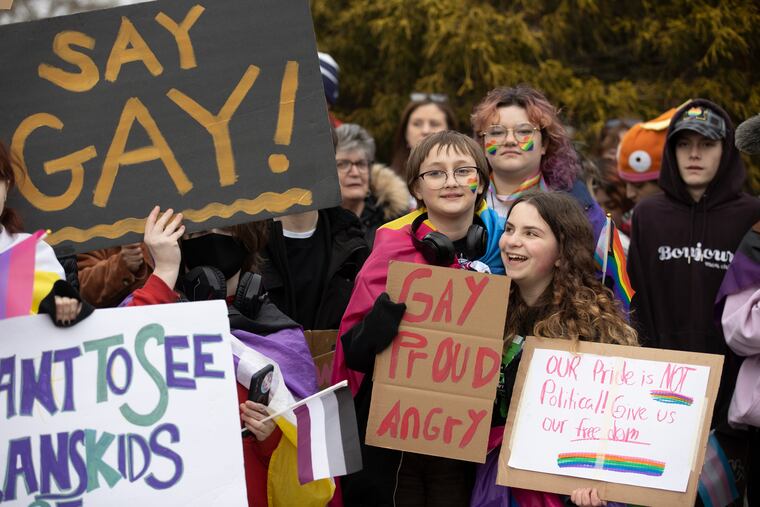Pride flag ban in Central Bucks discourages conversations students need to have
We should expose children to the questions, instead of pretending that we have all of the answers.

Let’s start with the easy part.
The Central Bucks School District shouldn’t have banned teachers from advocating “partisan, political, or social policy issues” in classrooms. That blocks teachers from displaying Pride flags, among other symbols, and it’s likely to inhibit discussions of gender identity and sexuality as well.
The school board says it’s trying to prevent “indoctrination.” But its policy is an act of indoctrination in its own right, of course. Instead of engaging these difficult topics, Central Bucks wants to take them off the table. And the best way to impose your own ideas is to prevent encounters with other ones.
But here’s the harder question: What should schools teach about gender and sexuality?
To many younger and liberal people living in the U.S., the answer is obvious: Tell students that gender is fluid, not fixed. But these same people will sometimes insist — as per the Lady Gaga anthem “Born This Way” — that gender identities and sexual orientations are fixed in the womb. Sure, some people might be born with changing identities. But that isn’t the way most people interpret the song: I was born gay or lesbian or bisexual, so you can’t — or shouldn’t — change me. “I’m beautiful in my way,” Gaga sings. “God makes no mistakes.”
We see the opposite contradiction on the right, where people will tell you that male and female are immutable categories — and then criticize imagined “groomers” for imposing, for instance, new genders on children.
I wish our classrooms — especially in high schools — could explore these complexities. But I’m not sure we have enough courage to let that happen.
“I wish our classrooms — especially in high schools — could explore these complexities.”
If we did, teachers would ask students whether trans athletes should be allowed on teams that match their gender. That’s a big question in secondary schools and also at colleges like Penn, where trans female swimmer Lia Thomas has become a lightning rod of controversy. Advocates praise her for her bravery — and her medals — while critics say she has an unfair advantage competing against other women.
We’d also discuss the highly contested issue of puberty blockers for trans children. As the New York Times noted earlier this year, there is little scientific consensus about the potential side effects of these drugs.
That’s all the more reason we need to talk about these issues with our students. What does it mean to be male, female, or nonbinary? And how should the medical community treat people who want to transition from one gender to another?
By banning symbols that support the LGBTQ community, the conservative majority on the Central Bucks school board is making it harder for kids and teachers to have these conversations. Ditto for school officials in Pennridge (also in Bucks County). Ocean City, N.J., may soon follow suit, after the election of three parents to the local Board of Education who campaigned for “conservative values” and against New Jersey’s new standards for teaching health and sexual education.
But I’m not sure how many people on the left want our young people to face these questions, either. At Penn, where I teach, students have told me they are afraid to publicly question whether Thomas should swim on the women’s team. That would put them at risk of being labeled a “transphobe,” one of the scarlet letters of contemporary cancel culture.
Never mind that other trans female athletes — including long-distance runner Andie Taylor — have wondered whether they should be allowed to participate in women’s races. (“I only want to win if I know it’s fair,” Taylor said, in a 2021 video op-ed.) Every good human being thinks trans people should compete against others of their gender, or so the argument often goes. And if you think otherwise, you must be a very bad person.
» READ MORE: We need to be able to talk about trans athletes without shouting each other down | Opinion
Likewise, puberty blockers have become accepted left-wing wisdom. If you believe that trans lives matter, you will support any medical treatment that assists people in transitioning. It doesn’t matter that puberty blockers may inhibit bone density, which could put kids at risk of debilitating injuries later. And it certainly won’t matter that Sweden and Finland — two countries often venerated for their progressive approaches to gender and sexuality — have placed strict restrictions on these drugs.
Let’s be clear: Transphobia and homophobia are real. You can see them in stark display at school boards in Bucks County and elsewhere, where frightened officials prattle on about groomers and seek to squelch discussion about gender and sexuality.
But people on the left also suppress that discussion, which may reflect its own phobia: the fear of students thinking for themselves and coming to the “wrong” conclusions. And that’s not right, either.
Our children already know that we disagree. So we should expose them to the questions, instead of pretending that we have all of the answers. Anything less isn’t education. It’s indoctrination.
Jonathan Zimmerman teaches education and history at the University of Pennsylvania. He is the author of “Whose America?: Culture Wars in the Public Schools,” which was recently published in a revised 20th-anniversary edition by the University of Chicago Press.